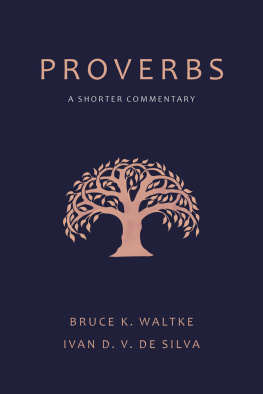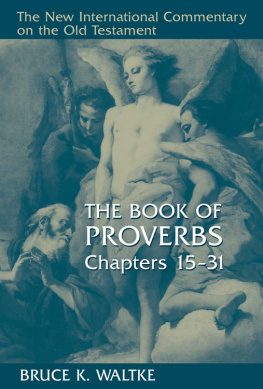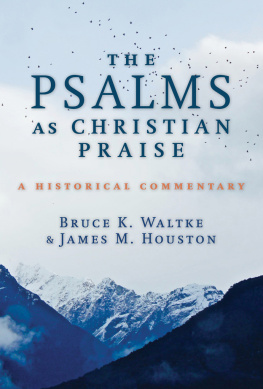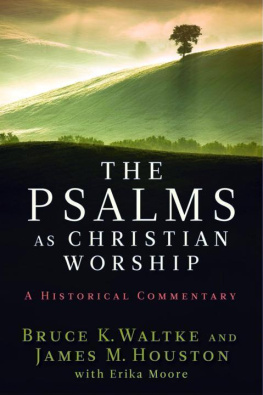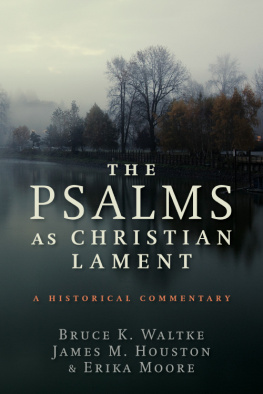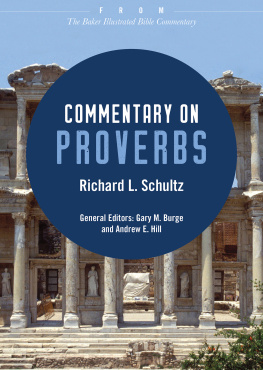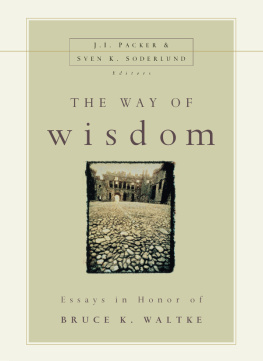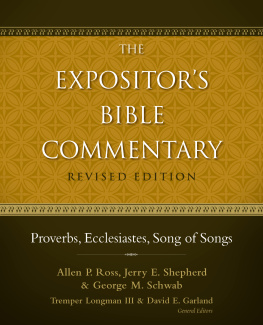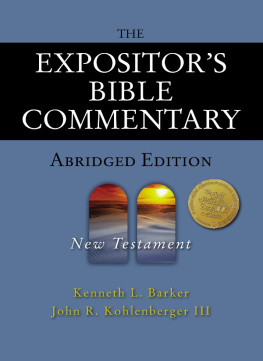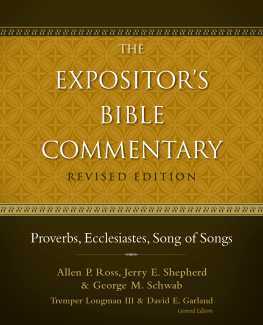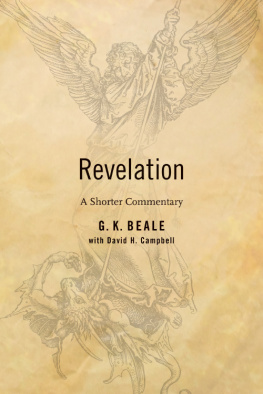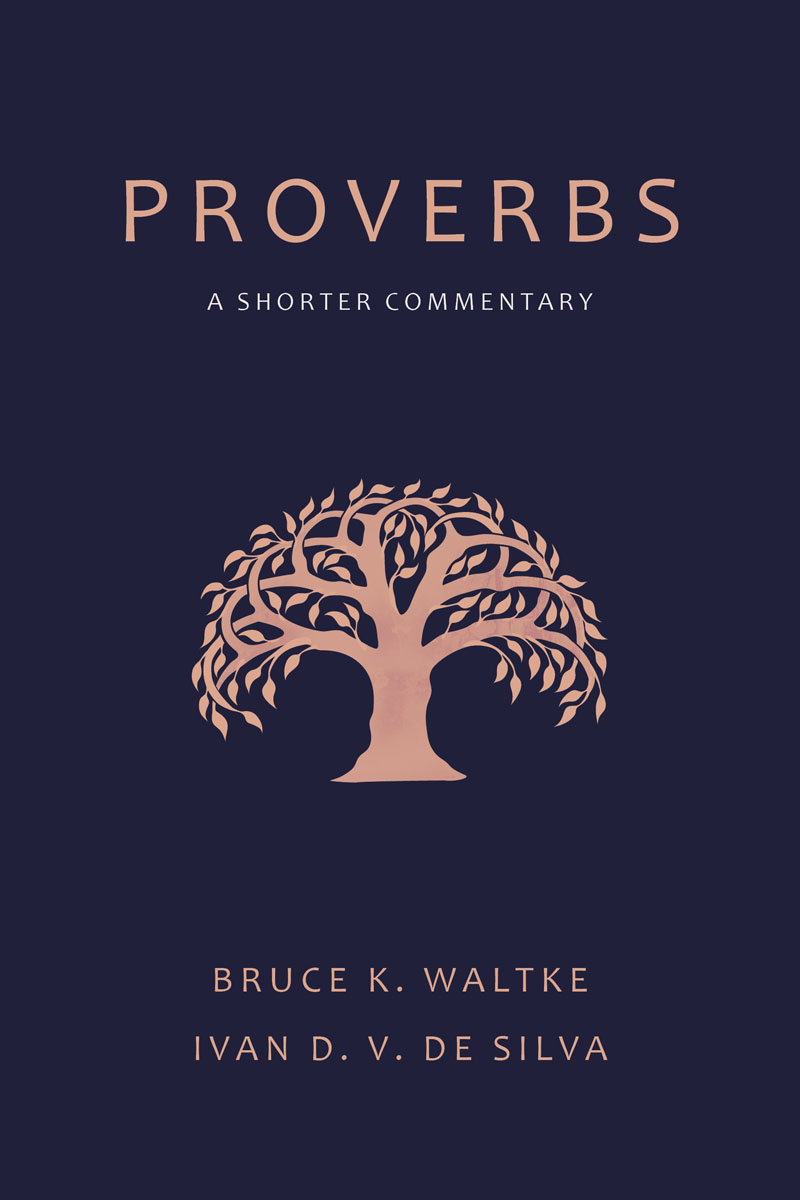

Wm. B. Eerdmans Publishing Co.
4035 Park East Court SE, Grand Rapids, Michigan 49546
www.eerdmans.com
2021 Bruce K. Waltke and Ivan D. V. De Silva
All rights reserved
Published 2021
Printed in the United States of America
27 26 25 24 23 22 21 1 2 3 4 5 6 7
ISBN 978-0-8028-7503-7
Library of Congress Cataloging-in-Publication Data
Names: Waltke, Bruce K., author. | De Silva, Ivan D. V., 1961 author. | Waltke, Bruce K. Book of Proverbs.
Title: Proverbs : a shorter commentary / Bruce K. Waltke and Ivan D. V. De Silva.
Description: Grand Rapids, Michigan : William B. Eerdmans Publishing Company, [2021] | Includes bibliographical references and index. | Summary: An abridged and more accessible version of Bruce Waltkes magisterial two-volume commentary on the book of Proverbs from the New International Commentary on the Old Testament seriesProvided by publisher.
Identifiers: LCCN 2020038629 | ISBN 9780802875037 (paperback)
Subjects: LCSH: Bible. ProverbsCommentaries.
Classification: LCC BS1465.53 .W353 2021 | DDC 223/.7077dc23
LC record available at https://lccn.loc.gov/2020038629
Contents
Preface
This commentary seeks to make Prof. Bruce Waltkes two-volume commentary titled The Book of Proverbs (Eerdmans, 2004) more accessible to students, pastors, and Bible readers in general.
The original commentary was a major scholarly work that sought to break new ground in its affirmation that the authors and redactors of Proverbs organized their material into discernible clusters or groupings. While peer reviews largely lauded the commentary, it proved challenging for the general reader. Its length, complex analysis, and use of the Hebrew text to demonstrate its main affirmation meant that some people found it too intricate and detailed for their purposes. Thus, the need for a simplified, abridged version accessible to a wider audience became apparent. The challenge of abridging the commentary centered on how to maintain the erudition, exegetical precision, and poetic insights of the original commentary while condensing it and simplifying its technical elements. Prof. Waltke invited his friend and former student, Ivan De Silva (ThM), to assist in the work. Ivan teaches in the Religious Studies departments at Trinity Western University and Pacific Life Bible College in British Columbia and serves as a detective in the Vancouver Police Department.
In 2016, Eerdmans approved the project, and we undertook the work in earnest. As the project progressed, we realized that mere condensation was not sufficient, as the commentary was by then more than ten years old, and new secondary literature on Proverbs had emerged. In addition, Waltke felt that the new work would benefit from revision of some of his earlier interpretations of the proverbs based on his further reflections. Accordingly, we decided that the abridged commentary would take into account both of these elements. Especially significant was the publication in 2009 of Michael Foxs second volume on Proverbs, covering chapters 1031, which was not available in 2004. However, in order to maintain the concise nature of the commentary we limited our selection from new research to topics such as the nature of the foreign woman, the Sitz im Leben (setting in life) for the dissemination of Proverbs in ancient Israel, the existence of doublets, and some newer exegetical insights on a few words and verses (e.g., 1:5; 8:30). Overall, however, the new research does not significantly alter the substance of the original commentary.
This work is intended for the Bible lover who is looking for a commentary on Proverbs that handles the introductory issues concisely and the contents faithfully. The current work, like the original, is divided into two parts: an introduction and an exegesis of the text. The introduction deals with issues of authorship, date, structure, and the character of Hebrew poetry, albeit more concisely than in the original. The introduction also includes theological reflection on topics such as God, humans, speech, and wealth, and includes word studies of many wisdom terms that appear frequently in the Proverbs (e.g., wisdom, the wicked, righteousness, the fear of I AM, etc.). Providing the word studies in the introduction eliminates the need to keep defining them each time they appear in the commentary. Instead, when a word appears in the commentary that we have described in the introduction, we will direct the reader to it by citing its page number in the introduction.
Most importantly, this is a Christian commentary. A whole section of the introduction compares the proverbs of Solomon and the sayings of the wise with the person and teaching of the Lord Jesus Christ.
The commentary proper divides the book of Proverbs into poems (chs. 19; 3031), collections, sections, and units on the basis of thematic and poetic considerations. A translation is provided for each unit, followed by exegetical comments on each verse and an assessment of whether the meaning of the verse is enhanced by its place in the unit. As appropriate, we offer theological reflections and anecdotes.
Readers familiar with the original work will notice some differences in this abridged version. First, in response to Eerdmanss request that its authors conform their style to the Chicago Manual of Style, Waltkes translation of the original Hebrew is here rendered more gender neutral, often by using plural pronouns to translate the original masculine singular pronouns. Likewise, in the commentary itself we have tried to achieve gender neutrality as much as possible by rendering the masculine singular pronoun by various other, more inclusive terms. However, many poems, such as those in the Prologue (1:89:18), and some aphorisms are addressed to the son, and so the masculine gender has been retained in those cases.
Second, the divine name, represented by the Hebrew consonants yhwh (the Tetragrammaton) and commonly rendered by the titular LORD, has been rendered here by its divinely revealed meaning of I AM (see Exod. 3:1315). Unfortunately, the scribes did not preserve the pronunciation of the divine name, and names such as Jehovah and Yahweh are speculative. What we do know is that Gods name is a sentence and in his own mouth (that is, in its first-person form) means I AM. Therefore, we chose to translate, instead of transliterating, Gods name according to how it appears in his own mouth.
Third, one of the prime contributions of the original commentary was to demonstrate that the proverbs have been arranged into meaningful clusters that require them to be interpreted both individually and in their larger context. In the case of many of the groupings, the demonstration of this requires detailed analysis of the Hebrew text. That is not possible in a concise commentary. Therefore, this aspect of the original is only reflected in the current volume to the extent that groupings can be easily discerned in the translation.
Fourth, in order to aid preachers and teachers, we have included a subject index that seeks to reference all the proverbs related to a topic. While no such index can be exhaustive in its coverage of subjects, we hope that the topics covered will aid in the study and preaching of the book. In addition, we added a few memorable citations and insightful illustrations.
Finally, a word must be said about the relationship between this abridged commentary and its two-volume predecessor. The nature of an abridged commentary is such that it cannot provide the detailed analysis and argumentation required to justify all of its conclusions. Thus, the concise commentary provides the meaning and interpretation of the Proverbs without a lot of the detailed research that demonstrates many of its conclusions. Readers requiring the exegetical background to the interpretation offered here should consult the major two-volume work, which functions as a massive footnote to this abridged commentary.
Next page
